MercoPress. South Atlantic News Agency
Tag: Guido Mantega
-
Friday, April 25th 2014 - 05:41 UTC
Mantega confident that this year the 'the villain factor' in inflation is contained
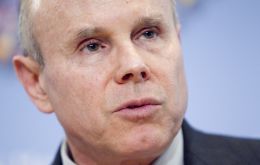
Ever-optimistic Brazilian Finance Minister Guido Mantega said a recent rise in consumer prices was expected, ('there's always a villain factor pushing inflation')' anticipating that in May/June the index will be lower. Mantega also denied local news reports that the government was seeking a change in the index methodology as a way to eliminate the impact of volatile food prices.
-
Wednesday, April 9th 2014 - 06:48 UTC
Osborne launches with Mantega Brazil/UK 'economic and financial dialogue'
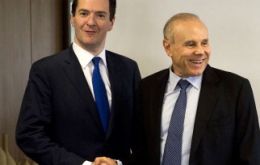
Finance minister Guido Mantega and Chancellor of the Exchequer George Osborne announced on Tuesday in Sao Paulo the launching of the Brazil/UK Economic and Financial Dialogue to strengthen bilateral trade and cooperation, and investment in infrastrucutre, according to a joint release.
-
Saturday, March 29th 2014 - 06:11 UTC
Brazil's 2,3% growth in 2013 came as a surprise, even for Minister Mantega

Brazil's economy expanded 2.3% in 2013, compared with growth of 1% the previous year, the Brazilian Institute of Geography and Statistics, IBGE, said this week. The country's GDP for 2013 was estimated at 4.84 trillion Reais (some 2.05 trillion dollars), the IBGE said.
-
Friday, February 21st 2014 - 07:12 UTC
Brazil announces budget spending cuts to meet primary budget surplus
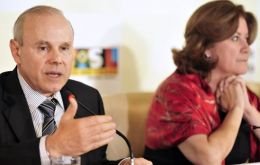
Brazil's government on Thursday announced 44 billion Reais (18.41 billion dollars) in spending cuts as it seeks to meet its primary budget surplus target for 2014. This year's cuts exceed the 38 billion Reais (some 15.9 billion) in budget reductions announced in 2013 and extend to all government departments except education, health, social development, and science and technology.
-
Saturday, January 4th 2014 - 04:38 UTC
Mantega releases crucial data to calm market anxiety about Brazil's accounts

Brazil's Finance Minister Guido Mantega insisted on Friday that the government is keeping spending under control as he sought to calm anxiety about the deterioration of the government's accounts. The minister said the primary budget surplus, (excess of revenue over expenditure before debt payments) would be above the goal of 73 billion Brazilian Reais for 2013 (30.5bn dollars), equivalent to about 1.5% of gross domestic product.
-
Monday, December 16th 2013 - 09:30 UTC
Brazilian economy walking on “two crippled legs” argues Minister Mantega

The Brazilian economy is walking with “two crippled legs” according to Finance Minister Guido Mantega who put the blame on the effects of the international slowdown with different rates of recovery, and the lack of credit to prop consumer spending.
-
Friday, December 13th 2013 - 13:04 UTC
Brazil to lower economy stimulus beginning with subsidized credit lines
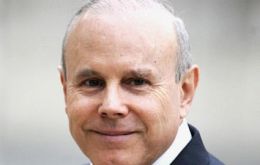
Brazil will raise interest rates on some state-subsidized credit lines in 2014 withdrawing part of the stimulus that helped boost investments but also hurt public finances this year. Interest rates on loans for the purchase of capital goods and trucks will climb to 6% per year, from 4%, while a special credit line for exports will climb to 8% from 5.5%.
-
Thursday, November 28th 2013 - 10:26 UTC
Rousseff reluctant to increase fuel prices fearing inflation and social unrest
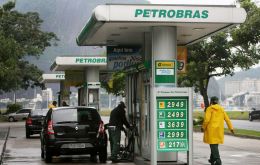
Brazilian president Dilma Rousseff is reluctant to allow the country's oil corporation Petrobras to increase the price of fuels this year, which would have an immediate impact on gasoline, transport and inflation, according to Folha de Sao Paulo.
-
Wednesday, November 27th 2013 - 06:43 UTC
Sound fiscal policy is new target of Brazilian economy: subsidies to be lessened
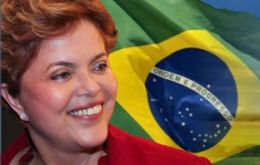
Brazilian Finance Minister Guido Mantega said on Tuesday the government will remove some subsidies and delay tax breaks to keep the country's fiscal policy sound. Likewise the state development bank, BNDES, will stop funding lines for regional government next year.
-
Saturday, November 9th 2013 - 06:02 UTC
October inflation eases in Brazil but food prices keep steady
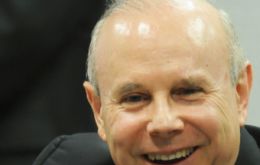
Consumer prices in Brazil edged up last month but remained stable at 5.8% over 12 months, the Brazilian Institute of Geography and Statistics (IBGE) reported Thursday. It put October inflation at 0.57%, up from 0.35% the previous month.
